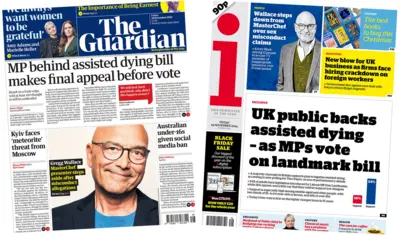We've updated our Privacy and Cookies Policy
We've made some important changes to our Privacy and Cookies Policy and we want you to know what this means for you and your data.
An hour with Maggie; Thatcher and Wales
- Author, David Cornock
- Role, ҙуПуҙ«ГҪ Wales Parliamentary correspondent
A search for "Wales" in the index of The Downing Street Years will prove a fruitless one.
Margaret Thatcher took power weeks after the Welsh people had voted overwhelmingly against a proposed assembly in Cardiff. For the Thatcher years, devolution was not on many people's agenda, and certainly not hers.
She had other UK-wide priorities, such as expanding home ownership - and she allowed her "ingenious" Secretary of State for Wales (1987-1990) Peter Walker to pursue his own policy in Wales. Walker's interventionist approach to the job showed how (administrative) devolution existed before 1999.
You won't find S4C in the index either - Thatcher's broadcasting priorities were focused more on allowing companies to make the most of new technology to expand the range of channels through satellite.
I interviewed her once. For an hour. She was as formidable as you might expect. Often, UK ministers of all parties when interviewed by Welsh media, are not across the detail of events in Wales but she had clearly done her homework.
She was sufficiently media-savvy to wave her arms around animatedly whenever our photographer raised his camera - and to target her message at the readers of the three newspapers I was working for.
She didn't like my questions and gave me something of a "handbagging" over the course of an hour. As the interview ended, she put a consoling arm on my elbow, almost by way of an apology although Margaret Thatcher was not a politician who said sorry much.
The interview has made it into the , although you may be disappointed to learn it is only available on CD-Rom.
The "Importance: Major" ranking has been added by officials. The best line from the interview was that she did not plan an early election (1991) but was thinking beyond that.
She was, of course, out of a job within five months of our interview, although that is probably a coincidence.
As today's tributes have confirmed she was certainly a divisive prime minister, both revered and despised, but as Martin Johnes has written she was not universally loathed across Wales.
Under her leadership, the Conservatives regularly polled almost one third of the votes in Wales. At one stage, they had 14 MPs - in 2010 they celebrated winning eight seats.
Top Stories
More to explore
Most read
Content is not available








